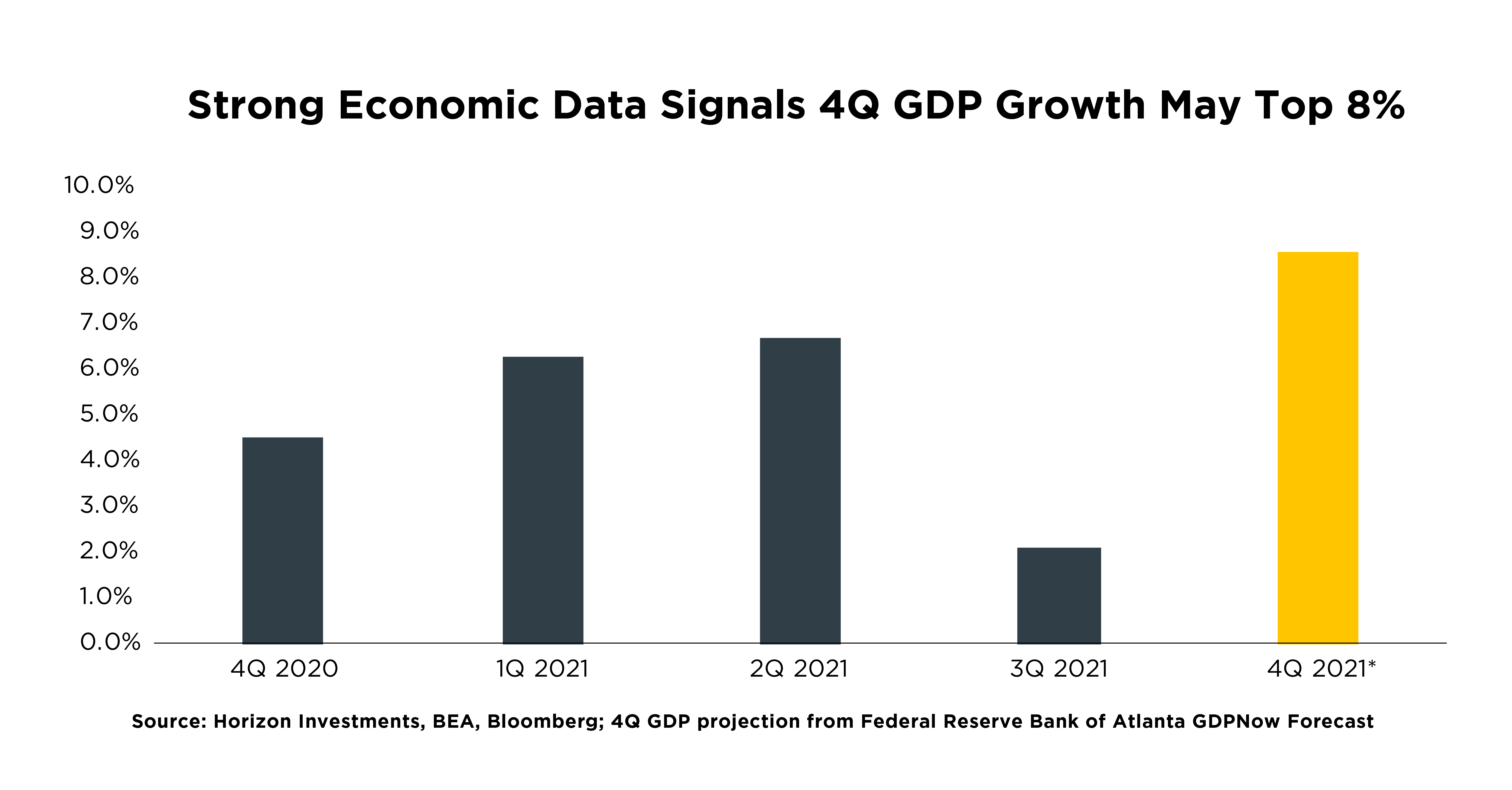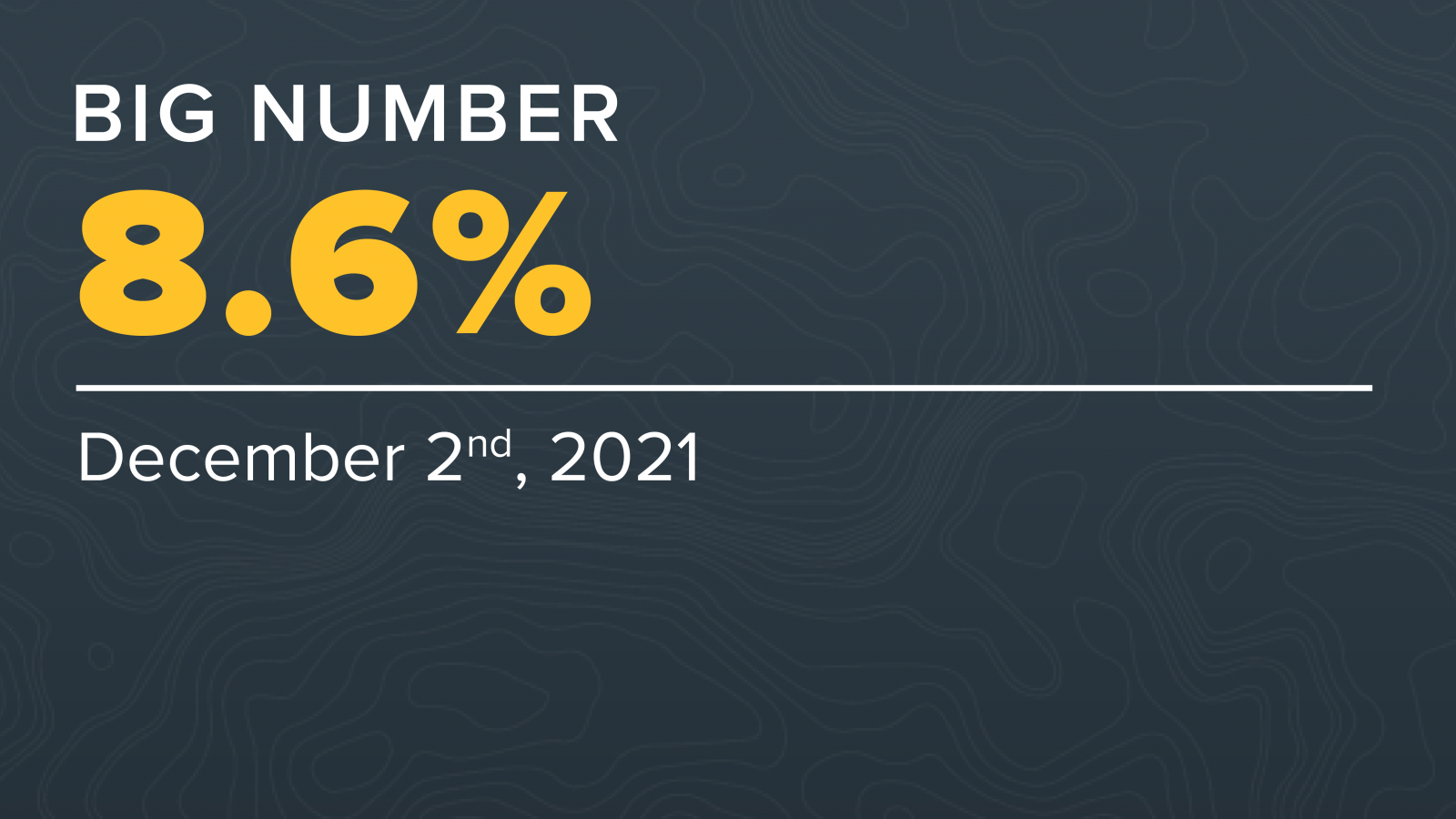When uncertainty soars and the narrative changes, financial markets can whipsaw investors. This week is a classic example of that.
The rollercoaster uncertainty around Omicron sparked volatile swings in stock, bond, and commodity markets worldwide. And then Federal Reserve Chairman Jay Powell contributed to the turmoil by changing the interest rate narrative. He endorsed a faster unwinding of the bank’s purchases of bonds as he jettisoned a ‘’transitory’’ view of inflation, opening the door to rate hikes.1
Powell’s inflation pivot is a recognition of the price pressures that come with a booming U.S. economy. Fourth quarter GDP is now pegged at 8.6% in the Atlanta Federal Reserve Bank’s GDPNow Forecast.2 It moved up after last week’s economic data showed that incomes continued rising in October and spending spiraled higher.3 Together, that’s a potent fuel for persistent inflation. If the 8.6% forecast turns out to be accurate, it would be the strongest quarterly GDP reading in 38 years, or since Q4 1983 (NOTE: the stat excludes last year’s massive, pandemic-affected GDP swings).

Last week’s report from the Bureau of Economic Analysis showed:
- Americans are still buying the durable goods that they splurged on during the pandemic despite still-high prices; spending in that category grew by 3.3%.
- Services spending rose 0.9%.
- Personal incomes rose as wage increases offset smaller unemployment checks.
- The savings rate of 7.3% remains at a historically healthy level, suggesting Americans still have the financial firepower to shop some more.
Americans continue to buy appliances, furniture, new and used cars, and pricey homes. Such strong spending despite the well-known supply chain delays and multiple sticker shocks is contributing to inflation remaining uncomfortably high for longer than many would have expected. Moreover, last week’s data indicated there’s no end in sight.
Turning to Omicron, it’s likely a lose-lose situation in terms of inflation. If the threat increases, it could spark higher prices by hobbling supply chains again. On the other hand, a fading of Omicron green lights another round of economic reopening, which could exacerbate the current problem of too much demand oustripping inhibited supply.
In light of the economic data and Omicron, Powell likely had little choice but to retire the central bank’s ‘’transitory’’ view of inflation.
Painful as it may be, a Federal Reserve interest rate hike may be precisely what the U.S. economy needs. Higher rates may cool Americans’ willingness to pay seemingly any price for goods and homes, relieving the pressure on businesses to raise wages to attract the workers they need to meet seemingly insatiable consumer demand. And that, in turn, may put a chill in inflation’s streak of hot readings.
What’s an Investor to Do?
First, we don’t see a need to panic or rush to make changes to your goals-based plan simply because Powell is closer to raising rates and inflation is currently high. In our view, the prospect of a moderate amount of interest rate hikes that lifts the Fed Funds rate off of 0% is unlikely to derail equity markets given GDP growth and corporate earnings are as strong as they currently are. And based on what we currently know, the potential rate hikes next year are unlikely to be large enough to alter the fact that bond yields remain at historic lows. Lastly, inflation is inherently hard to predict, as this year has amply shown. Other forces are at work, we noted November 18, which may turn the tide.
Gain Stage Investors: Our flexible, active approach to investment management is designed to help navigate the uncertainty surrounding consumer spending habits, the Federal Reserve’s interest rate path, and the pandemic’s twists and turns. Horizon believes equities can be more resistant to long-term inflation relative to other asset classes. As gain stage investors typically have a longer-term time horizon, reliance on equity markets can match the duration of their goal.
Protect Stage Investors: The change in the Fed’s rate hike timeline and inflation’s trajectory may increase volatility in both equity and fixed-income markets. It may be a good idea to talk to your advisor about employing risk mitigation techniques and the potential results from them..
Spend Stage Investors: Horizon Investments believes a higher exposure to equities than what is traditionally called for in this stage can better offset inflation than fixed income. As inflation is a large risk to investors who are distributing assets, investing in a strategy with exposure to equities and optimized towards desired spending rates has the potential to help investors meet their needs.
(Read our 2022 Outlook: “The Next `Unprecedented’ Year’’)
1 Wall Street Journal, “Powel Lays Groundwork for Faster End to Stimulus as inflation Outlook Worsens,” Nov.30, 2021
2 Federal Reserve Bank of Atlanta, atlantafed.org
3 Bureau of Economic Analysis, BEA.gov, “Personal Income and Outlays, October 2021”
This commentary is written by Horizon Investments’ asset management team. For additional commentary and media interviews, contact Chief Investment Officer Scott Ladner at 704-919-3602 or sladner@horizoninvestments.com.
Nothing contained herein should be construed as an offer to sell or the solicitation of an offer to buy any security. This report does not attempt to examine all the facts and circumstances that may be relevant to any company, industry or security mentioned herein. We are not soliciting any action based on this document. It is for the general information of clients of Horizon Investments, LLC (“Horizon”). This document does not constitute a personal recommendation or take into account the particular investment objectives, financial situations, or needs of individual clients. Before acting on any analysis, advice or recommendation in this document, clients should consider whether the security in question is suitable for their particular circumstances and, if necessary, seek professional advice. Investors may realize losses on any investments. Index information is intended to be indicative of broad market conditions. The performance of an unmanaged index is not indicative of the performance of any particular investment. It is not possible to invest directly in an index.
Past performance is not a guide to future performance. Future returns are not guaranteed, and a loss of original capital may occur. This commentary is based on public information that we consider reliable, but we do not represent that it is accurate or complete, and it should not be relied on as such. Opinions expressed herein are our opinions as of the date of this document. These opinions may not be reflected in all of our strategies. We do not intend to and will not endeavor to update the information discussed in this document. No part of this document may be (i) copied, photocopied, or duplicated in any form by any means or (ii) redistributed without Horizon’s prior written consent.
Horizon Investments’ strategies are subject to general market risk and risks related to currency fluctuations and economic conditions. Each strategy’s underlying investments fluctuate in price and may be sold at a price lower than the purchase price resulting in a loss of principal. Investors may lose money. The underlying investments are neither FDIC insured nor guaranteed by the U.S. government. There may be economic times where all investments are unfavorable and depreciate in value. Please evaluate your clients’ circumstances and risk tolerance to understand if these investments are right for them.
Other disclosure information is available at www.horizoninvestments.com.
Horizon Investments and the Horizon H are registered trademarks of Horizon Investments, LLC
©2021 Horizon Investments LLC

